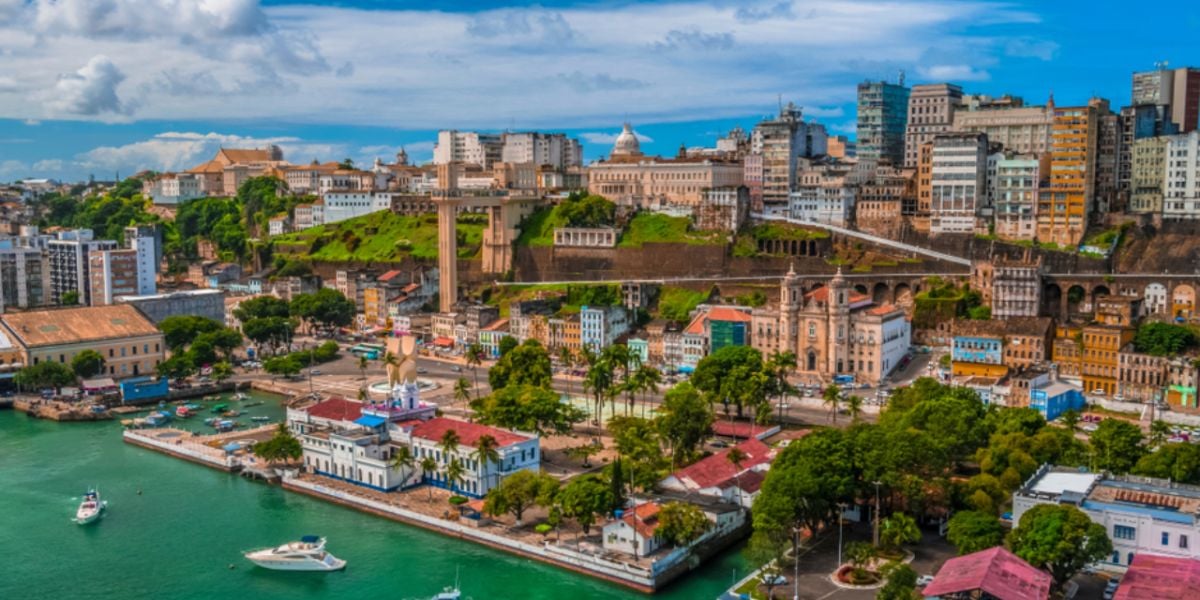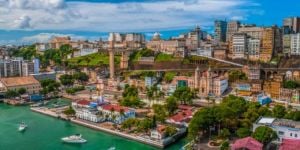
Salvador de Bahia has long been one of Brazil's leading economic centers. The economy today is diversifying, and there are jobs. But as an expat, you'll need specialized skills to land one. If you'd like to work in Salvador, you're advised to begin your search for a job from abroad. You can begin by reviewing Expat.com's general guidelines for working in Brazil.
About Salvador
As one of Brazil's oldest cities, Salvador has long played an important role in the economy of Brazil. Initially, it was the main port for shipping agricultural goods back to Europe, and the shipping and receiving of many types of goods is still a key segment of the local economy.
Not only did Brazil emerge from a recession that took its toll on Salvador, but it also recently had a blow to its economy due to the pandemic. The economy isn't booming as it was a few years back, but it's large and diversified, plus it's quickly recovering, so there are opportunities available for those who qualify.
Important components of the economy of Salvador and nearby areas include agriculture, shipping, automobile production, and tourism. Communications and information technology are growing in importance as well.
The economy of Salvador
Within Brazil, the state of Bahia is the 8th largest regional economy within the nation. This is thanks to its port, which has historically been key to Brazil's overall economy. For example, during the Portuguese colonial period, the country exported cacao, sugar, and tobacco, which helped Brazil prosper during these times.
Considering that this port is located in Salvador, this should be a huge clue as to how important Salvador is to Brazil's economy. In fact, it was the nation's original capital! It's always been an international trading center, which means the city has flourished with opportunities. For instance, even to this day, the port of Salvador is a vital point of trade, with exports of soybeans, cocoa, sisal, and petrochemical products. Domestic industries that are of interest here include cigar manufacture, oil and gas extraction, oil refining, and fishing.
Salvador also has a huge tourism industry. It's actually a UNESCO City of Music, with an amazing mix of music styles that draw in people from all over. There are also plenty of free public music performances in Centro Histórico, which is one of the most well-known districts in Salvador. This shows both citizens and tourists that Salvador is a place worth being in.
Not only is Salvador strong in the arts department, but also in sports. Originally Estádio Octávio Mangabeira, or the Fonte Nova Arena, a soccer stadium was built in 1951 and seated over 66,000 people. But it was replaced with a newer version called Itaipava Arena Fonte Nova, which now sits 56,000 attendees. It hosted several prominent matches (such as the 2013 FIFA Confederations Cup and the 2014 FIFA World Cup), which adds to its allure for visitors from both Brazil and across the world.
Sectors with potential
Many large Brazilian and international companies are represented in Salvador. A few of the larger and better-known companies include Ford Motor Company, Petrobras, and PwC.
The automotive industry is now well established in the area. Ford operates a very modern assembly plant that relies heavily on robotics. Those with industrial or mechanical engineering backgrounds should apply. The Chinese automaker JAC also has a plant here.
Petroleum and petrochemicals are growing sectors across Brazil, including Salvador. Salvador is home to a large oil refinery and also a petrochemicals plant. Job seekers with the requisite skills can seek work here.
The information technology and communications industries are also growing and represent possible avenues.
For those with non-technical backgrounds, tourism may present the best opportunities. Salvador, as one of Brazil's oldest cities, boasts many colonial buildings. The local government has renovated the historic district of Pelourinho in a bid to increase tourism further. Salvador is also a popular tourist destination because it preserves many traditions brought from Africa, which even today are reflected in local dress, food, and music.
There's one international school in Salvador: the Pan American School of Bahia. Certified teachers or education administrators may wish to apply. There are also several universities (both public and private) in Salvador. You'll need an advanced degree and at least a working knowledge of Portuguese.
Writing a Brazilian resume
As expected, your resume should be in Portuguese. You might be able to get away with English if you're applying for a multinational company. Make sure it's concise, as it can't be over two pages long.
List your qualifications and prior experience, starting with the most recent entries first. You should also list your education, but not your elementary education.
You'll need to include a cover letter. In this letter, you should tell the potential employer what you hope to achieve and why you think you'll be an asset to the company.
Finding work in Salvador de Behia
The beauty of the internet is that you can search for and apply for jobs online before you even book tickets to fly to Brazil. In fact, it's highly recommended that you find and secure a job before you travel to Brazil, as you need to have a company sponsor you for a visa. So don't think that you can just fly over to Brazil on a tourist visa, find a job, take it, and then stay in the country.
A great way to start your job search in Salvador is to browse LinkedIn. Spruce up your resume and narrow your search down to jobs in Salvador on this platform. Then start applying and hopefully, you'll hear back from HR and recruiters soon.
Some other avenues include multinational and inter-governmental firm websites if that's what you're qualified for. You can also check out your home country's embassy website, as they might have some leads on potential job openings in Brazil. They may also have a list of international firms, so you can research jobs at these companies on your own.
Do note that there are lots of scammers posing as headhunters and employment agencies on the internet. If anything ever sounds too good to be true, it probably is, especially if they approached you first. Trust your gut and walk away; otherwise, they might scam you out of money and also waste your time in your job hunt.
Other avenues
Besides using the internet, you should also try good old-fashioned networking, especially if you have friends who are Brazilian or know people who are. If you haven't spoken to your Brazilian friends in a while, then perhaps it's time to start meeting up with them more often so you can utilize their resources.
You can also try looking through Brazilian newspapers for job openings. This might be a little tough to do from overseas, but some have websites you can browse.
If you speak Portuguese, then you'll have a huge leg up on other expats who want to find work in Brazil. And if you're fluent in English, this will be a huge plus point as well. This applies to both the private and public sectors.
On that note, if you're a native English speaker or are fluent, a promising way to get a job in Brazil is to approach schools and universities. Many will be glad to have you on board to teach English, so you just might be able to find an institution that'll sponsor your work visa. You can also work as a private tutor, but this might take more networking and luck to find something.
Lastly, you can also try an employment agency. This will cost you some money, but they can get things moving a lot quicker since they're already in the country and are knowledgeable about workforce gaps in certain industries.
Some things to note about job searching
You should know that in general, finding a job won't be easy. Not only do Brazilian companies need to sponsor your work visa, but they must also show that they weren't able to hire local talent before they can hire you. They're also limited by the law, which requires that their workforce is at least two-thirds native Brazilian. The only exception is in the agriculture industry.
Do note that if you're married to a Brazilian citizen, have a Brazilian-born child, or you've lived in the country for at least 10 years, the above restrictions don't apply to you.
Also, the country doesn't recognize titles and certificates obtained from abroad. For example, if you work in a specialized field in your home country and have licenses and certificates, those won't count in Brazil. You'll have to retake exams and obtain Brazilian licenses and certificates. This might take some time to do, and the exams are in Portuguese, so you must be fluent in the language to succeed.
Because it's so difficult to find a job on your own in Brazil, a good alternative is to work for a multinational company in your home country and then ask for a transfer to a Brazilian branch.
Work culture
If you're coming from a Western country, then it shouldn't be hard to adapt to the Brazilian workplace. This is because their work culture is pretty similar. There's a hierarchy that you must pay attention to and respect, and the workplace is usually formal and corporate.
For those working corporate jobs, you can expect your coworkers and superiors to be well-educated, and therefore, they should be able to speak some English with you. The younger the workforce, the more English they'll be able to speak since Brazil's emphasized more English education in the younger generations.
Because the workplace is formal and corporate, it shouldn't come as a surprise that you'll need to dress professionally. Brazilians are very particular about appearances, so make sure you stay on top of looking your best and tidy.
On the other hand, you'll probably be in for a shock when you attend your first meeting and you're the only person who arrives on time. Despite having formal and corporate workplaces, Brazilians are very lax when it comes to time. It's normal to see people who arrive 10 to 20 minutes late. Of course, it's good to always arrive on time yourself, but be patient, as it's the cultural norm to arrive late to meetings.
Another thing that might shock you in a Brazilian workplace is how close everyone is. In fact, interpersonal relationships are of utmost importance, so you need to work hard to get to know everyone and fit in. When greeting your coworkers, hugs are acceptable. And if you're a woman, or the person you're greeting is a woman, then kissing both cheeks is to be expected when greeting one another.
In general, the culture is more relaxed and informal the further north you go. This includes in the office as well. Considering that Salvador de Bahia is in the middle, but more towards the north, you can expect your workplace to be somewhat casual. And if you spend time with your coworkers after work, they'll also be more laid back.
Living in Salvador
With its long history, Salvador is culturally rich. You can eat moqueca (a seafood stew) or munch on acarajé (a unique fritter made of deep-fried bean paste, split open and stuffed with shrimp and other fillings) while watching an authentic performance of capoeira (Brazil's unique mix of martial arts and rhythmic dance). The colonial history is still evident in many parts of the city.
But many will be drawn to the many beaches in and around Salvador. Some are sheltered and are wonderful venues for swimming, sailing, or just lounging, while others offer stronger waves for surfers.
A factor to consider is that Salvador has a high crime rate, including violent crime, and has had for years. If you plan on living here, then choose your neighborhood carefully. The better (and more expensive) neighborhoods include Itaigara, Pituba, Horto Florestal, Caminho das Ãrvores, Loteamento Aquárius, Brotas, Stiep, Costa Azul, Armação, Jaguaribe, and Stella Maris. Be especially careful if visiting the Cidade Baixa ("Lower city") in the northwestern district of the city.
Salvador's weather is generally fine and there's no true winter. The cost of living is low for a large city and those with good salaries can live well.
Useful links:
Professional positions, Glassdoor reviews
We do our best to provide accurate and up to date information. However, if you have noticed any inaccuracies in this article, please let us know in the comments section below.








